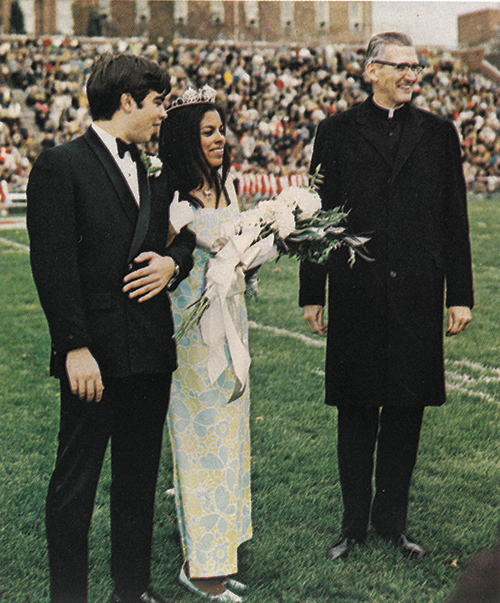Thank you, Frank
It was the late 1960s. it was a time of the Vietnam War, Hair, assassinations, civil rights movements, the draft, peace signs, love beads, miniskirts and the Jackie Kennedy pillbox hat.

I was on a student volunteer committee that helped plan activities in Kennedy Union. As we watched candidates being announced for Homecoming queen, our little student committee shook our heads. “If we were running a campaign ...” we would lament among ourselves. One day someone asked, “Why not?” Why not indeed? All we needed was a candidate.
And that’s how I got recruited. Sam Jackson — an engineering major who played classical guitar and was active in the drama club — became my campaign manager. With Blacks making up fewer than 3% of the student body, having both a Black queen candidate and a Black campaign manager was historic.
Our little group enjoyed creating a theme, posters and badges and planning activities.
On the day of voting, I learned more than 30 bogus complaints had been filed against me to try to get my votes disqualified. Sam and I were brought before the student governing board to defend our campaign. By the time I got back to my dorm room at Marycrest Hall — where I was the first Black resident assistant — I was in tears. I called my parents, wailing over the phone, unable to explain what had happened. My mother insisted that my father get in the car immediately to drive from Yellow Springs to Dayton to find out “what happened to our baby!”
Crowded into my dorm room were: Margaret “Peg” Holland, dean of students; Eleanor “Ellie” Kurtz, director of the student union; my parents; and my younger sister. With balls of Kleenex overflowing a waste can from my nonstop tears, I emphatically declared that I did not want to go to the football field where the winner would be announced.
“Wash your face and put your coat on,” Dean Holland demanded. “It’s time to go.”
Shrugging on a coat, I reluctantly walked out of my room to find the hallway filled with the girls on my floor who were waiting to escort me down to the field. As my name was called to walk out to join the other candidates, the floodlights lit up the benches in the stadium. I heard a roar from the crowd and watched in amazement as I received a standing ovation from the students.
I remember turning to Sam and saying, “It doesn’t matter anymore who won. Seeing this has made it all worth it.”
“It doesn’t matter anymore who won. Seeing this has made it all worth it.”
It’s another story for another time about my sitting on the queen’s throne of the float during the Homecoming parade, waving to those lining the streets in the Black neighborhood as people waved back, tears streaming down their faces. Or how one of the other campaign managers confided he would have done the same for me if I had let him run my campaign, and he hoped I didn’t take it all personally. Or how the white attendants in my court refused to take a photo with me for the weekly Negro news magazine Jet.
On the day of Homecoming — in a long gown borrowed from one of the girls on my floor — I was told I would be escorted on the field by Frank Surico. That was OK by me. I knew Frank. He hailed from New Jersey, and we had been in some classes together.
I only learned much later that Frank had volunteered to escort me; the other white males who were designated to be escorts declined to do so. Today, the photograph of the two of us on the football field at halftime with Father Raymond A. Roesch, S.M., then UD president, is considered to be iconic.
I have kept in touch with Frank sporadically. Recently, we had lunch when I was back in town. It had been at least five years since I had seen him last.
“Thank you,” I said with tears in my eyes, as we finished up our meals.
Shrugging his shoulders nonchalantly he responded, “Honestly, I don’t even remember how I ended up escorting you.”
Oh, but I do, Frank. And I will never be able to thank you enough. From the bottom of my heart, thank you, Frank.
Another of the firsts for Westina Mathews Shatteen was being the first woman and person of color to be elected as a trustee of the Merrill Lynch Foundation. She also has served on UD’s board of trustees. She is co-editor of Soul Food: Nourishing Essays on Contemplative Living and Leadership (Church Publishing, 2023).